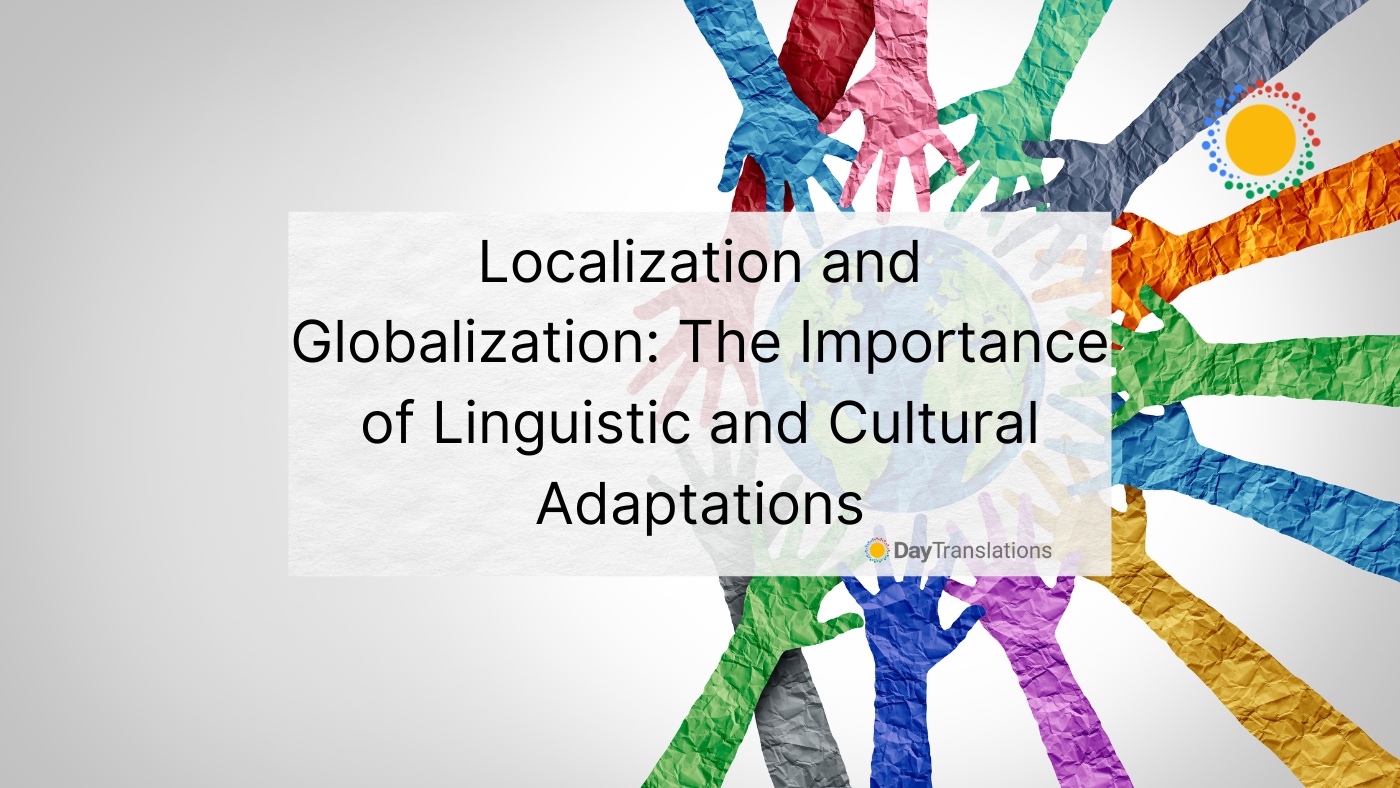Today, distance and language barriers are gradually dissolving, paving the way for a truly global society. Businesses and individuals alike recognize the immense opportunities arising from expanding their reach beyond borders. However, a crucial step must be taken to effectively connect with diverse audiences across different cultures and languages: localization and globalization.
Localization, the process of adapting content to specific cultures and languages, goes beyond mere translation. It involves understanding a particular target audience’s nuances, customs, preferences, and sensitivities, and tailoring content to resonate with them on a deeper level. While globalization has opened up immense possibilities for reaching wider audiences, it is the art of localization that holds the key to truly engaging and connecting with those audiences.
In this article, we will explore the significance of localization in the context of globalization and discuss why adapting content to specific cultures and languages is essential for reaching a wider audience.
Join us on this journey as we unravel the power of localization and globalization and discover how it can transform your content from merely being understandable to becoming truly relatable and impactful across borders!
Why the Big Fuss About Localization and Globalization?
Imagine this: You’ve poured your heart and soul into creating a compelling piece of content that you believe has the power to captivate audiences around the world. But as you eagerly release it into the vast global landscape, you soon realize that your message falls flat, lost in translation and cultural misalignment. In a world where borders are increasingly blurred, how do you ensure your content truly resonates with diverse audiences? The answer lies in the art of localization.
What are the Benefits of Localization?
Although there are countless benefits to localization, here’s a look at some of the most significant advantages of localization:
Enhanced Audience Engagement and Connection
Localization allows you to tailor your content to resonate with specific cultural and linguistic preferences of your target audience. By speaking their language, both literally and figuratively, you can create a deeper connection and foster a sense of understanding and trust. This, in turn, leads to increased engagement with your content, as it feels more relatable and relevant to the local audience.
Increased Brand Perception and Credibility
When you adapt your content to local cultures and languages, it demonstrates a commitment to understanding and respecting your audience. This cultural sensitivity enhances your brand perception and credibility in the eyes of the local market. By speaking their language and incorporating elements that align with their values, you establish a stronger presence and are more likely to be seen as a trusted and reputable entity.
Improved User Experience and Customer Satisfaction
Localization goes beyond mere translation; it involves considering the entire user experience. By adapting your content to local preferences, you can provide a seamless and intuitive experience for your audience. This includes aspects such as using familiar design elements, incorporating local payment methods, and providing customer support in the local language. By prioritizing user experience, you enhance customer satisfaction and build long-lasting relationships with your audience.
Higher Conversion Rates and Market Expansion Opportunities
Tailoring your content to specific cultures and languages increases the likelihood of resonating with your target audience on a deeper level. This leads to higher conversion rates as your audience feels more inclined to engage with your products or services. Additionally, effective localization opens up new market expansion opportunities by allowing you to tap into previously untapped regions, thereby unlocking the potential for business growth and increased revenue.
The Pitfalls of Neglecting Localization
Brands that ignore the vital importance of localization in their globalization strategy stand to lose their competitive edge in the market. Here’s a look at some of the negative outcomes that might arise when localization is neglected:
Misinterpretation of Content and Messaging
Neglecting localization can lead to misinterpretation of content and messaging. Direct translations often fail to capture the nuances, cultural references, and idiomatic expressions vital for effective communication. This can result in confusion, miscommunication, and even unintentional offense, alienating the audience and damaging your brand’s reputation.
Offending or Alienating Target Audiences Across Multiple Markets
Cultural differences play a significant role in shaping values, beliefs, and social norms. Your content risks unintentionally offending or alienating the local audience of the target market without considering these nuances in your globalization strategy. Insensitive references, inappropriate humor, or cultural insensitivity can lead to backlash, negative publicity, and a loss of potential customers.
Failure to Resonate with Target Market Customs, Preferences, and Sensitivities
Neglecting the localization process means missing out on opportunities to resonate with local customs, preferences, and sensitivities. Each culture has unique traditions, tastes, and values. Not adapting your content to align with these cultural factors makes your message feel disconnected and irrelevant across multiple languages. This can hinder your ability to establish meaningful connections with your audiences across international markets and limit your potential for success in that market.
Missed Opportunities for Business Growth and Global Success
Neglecting language translation and localization closes the door to significant business growth and global success. Failing to adapt your content limits your ability to penetrate new markets and effectively engage with diverse audiences in their native language. This hinders your expansion efforts and prevents you from capitalizing on the full potential of globalization. Competitors who prioritize localization may seize these opportunities and gain a competitive advantage, leaving your business at a disadvantage with a specific target audience.
Balancing Localization with Brand Identity
It is critically important to maintain brand consistency while also adapting your offering to cultural differences. When you strike this perfect balance, it allows for effective communication while maintaining your brand identity and reputation. Here’s how to get it right from the start:
Maintaining Consistency While Adapting to Cultural Differences in Local Markets
Balancing localization with brand identity involves finding the delicate equilibrium between adapting content to resonate with local cultures while maintaining a consistent brand image. Ensuring that your localized content reflects your brand’s core values, messaging, and identity is essential. This consistency builds brand recognition and reinforces a sense of trust among your global audience.
Adapting Messaging for the Target Audience Without Diluting Core Brand Values
While adapting content to specific cultures, it’s crucial to maintain the integrity of your brand’s core values. Localized messaging should align with the local audience’s preferences and cultural sensitivities but maintain your brand’s essence. Striking the right balance ensures that your brand remains authentic and resonates with the local audience while staying true to its overarching identity.
Wrapping Up
The power of localization and globalization in reaching and engaging diverse audiences cannot be underestimated in a world that is becoming increasingly interconnected. Throughout this article, we have explored the vital role of localization in the context of globalization, emphasizing the importance of adapting content to specific cultures and languages. We have seen how effective localization enhances audience engagement, builds brand credibility, improves user experience, and opens up new market expansion opportunities.
Localization is not merely a buzzword but a strategic imperative for businesses and content creators seeking to thrive in the global marketplace. Neglecting localization can lead to miscommunication, cultural insensitivity, and missed growth opportunities. However, you can transcend language barriers and cultural differences by embracing localization and forging genuine connections with your target audience worldwide.
To truly unlock the potential of localization, consider leveraging the expertise of professional localization services. These experts possess the cultural and linguistic knowledge necessary to adapt your content effectively, ensuring it resonates with your target audience in each market. By partnering with localization specialists, you can navigate the intricacies of cultural adaptation while maintaining the integrity of your brand identity.
Whether you’re an e-commerce business looking to expand into new markets or a content creator seeking a wider audience, investing in localization will propel your endeavors to new heights. Connect with localization professionals who understand the nuances of cross-cultural communication and can help you tailor your content for maximum impact.
Remember, the world is waiting to hear your message. Embrace localization, and let your content transcend borders, cultures, and languages.














Sorry, the comment form is closed at this time.